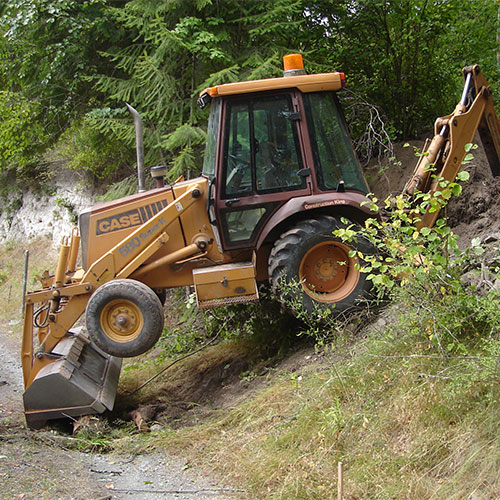Dump Truck Companies in Ohio - Reputable Dump Truck Solutions Throughout Ohio
Dump Truck Companies in Ohio - Reputable Dump Truck Solutions Throughout Ohio
Blog Article
Comprehensive Excavation Methods: Understanding the Fundamentals for Success
The careful preparation, exact execution, and precise interest to detail needed in excavation jobs demand a thorough strategy that includes different fundamental aspects. The real proficiency exists not simply in comprehending these basics however in seamlessly integrating them to browse the complexities of excavation projects with finesse.
Understanding Excavation Task Preparation

The initial stage of any type of excavation job is the planning phase, where crucial choices are made that can significantly impact the outcome of the task. Comprehending the job timeline, budget, and extent restraints is essential for developing a detailed excavation plan that guarantees the job's success.
One secret facet of excavation job preparation is the development of a detailed timeline that outlines the series of deadlines, tasks, and milestones. This timeline works as a roadmap for the job team, enabling them to track development and make essential modifications to guarantee the task stays on timetable. Additionally, a distinct budget plan that accounts for all expenses, consisting of equipment service, labor expenses, and products, is important for avoiding expense overruns and delays. By thoroughly thinking about all these factors during the planning phase, excavation tasks can be carried out effectively and efficiently, resulting in successful outcomes.
Dirt Evaluation and Site Examination
Performing complete soil analysis and website assessment is a vital action in the prep work stage of any type of excavation project. Dirt analysis involves figuring out the make-up, structure, and residential properties of the soil at the excavation site. This information is essential for recognizing the soil's bearing capacity, moisture content, and capacity for erosion, which are crucial aspects in determining the excavation methods and tools required for the job.
Site evaluation goes past dirt analysis and includes a broader evaluation of the general site problems. This assessment includes determining any kind of possible dangers, such as below ground utilities, ecological issues, or unstable terrain, that can impact the excavation process. By completely assessing the site, job supervisors can create effective excavation techniques that focus on safety, effectiveness, and ecological defense.
Utilizing sophisticated technologies like ground-penetrating radar, soil tasting, and drone surveys can boost the accuracy and effectiveness of soil evaluation and site assessment. Investing time and sources in these initial steps can ultimately save time and stop costly delays or difficulties during the excavation process.
Devices Selection and Utilization
Effective excavation projects depend heavily on critical tools option and use to make sure optimal performance and productivity. Choosing the best devices for the job is essential in making best use of performance and decreasing downtime. Elements such as the kind of soil, depth of excavation, and task range play a substantial role in identifying the most ideal devices for the task available.

Along with picking the suitable tools, proper utilization is vital to project success. Operators should be trained to manage the tools securely and successfully - lancaster excavation. Routine upkeep checks and prompt fixings aid stop failures and make certain consistent performance throughout the project
Safety And Security Measures and Laws Conformity
In the realm of excavation projects, focusing on precaution and conformity with regulations is vital to making sure a safe and secure and legitimately sound operational setting. Precaution encompass a variety of techniques, including conducting complete site evaluations, executing proper signage and barriers, and supplying adequate safety training for all personnel associated with the excavation process. Adherence to policies, such as OSHA demands in the USA, guarantees that the excavation task meets the required standards to protect workers, onlookers, and the surrounding atmosphere.

Monitoring Progression and Adjusting Strategies
Exactly how can project supervisors efficiently track the advancement of excavation jobs and adjust their techniques accordingly to optimize results? Tracking development is vital for ensuring that excavation projects stay on track and meet due dates.

Final Thought
To conclude, grasping the fundamentals of thorough excavation approaches is important for the success of any type of job. By understanding job preparation, examining soil and site conditions, selecting ideal equipment, following security laws, and checking progress, project managers can make sure a smooth and effective excavation process. Applying these techniques will certainly lead to effective outcomes and decrease prospective dangers or troubles throughout the excavation task.
The preliminary phase of any excavation job is the planning stage, where critical choices are made that can significantly influence the outcome of the task. Recognizing the task budget, scope, and timeline restraints is important for creating a detailed excavation plan that guarantees the project's success.
Just how can project supervisors properly track the advancement of excavation tasks and adapt their techniques accordingly to enhance outcomes? By carefully checking progression and being prepared to address adapt strategies, task managers can enhance the overall success of excavation tasks.
By comprehending task planning, examining soil and site conditions, selecting suitable tools, abiding with safety regulations, and keeping track of development, task supervisors can make certain a effective and smooth excavation process.
Report this page